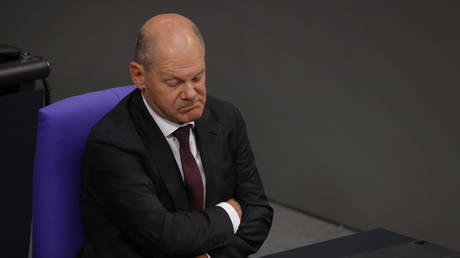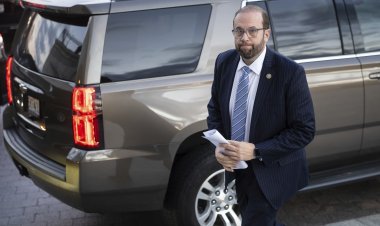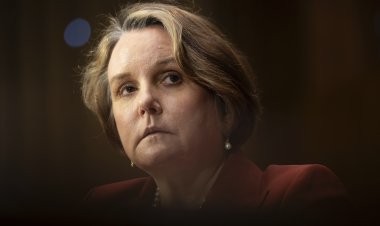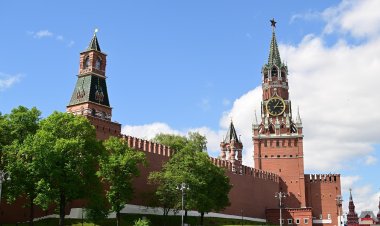Olaf Scholz experiences a sudden realization regarding Russia
Germany’s outgoing chancellor seems to have experienced a moment of clarity regarding the importance of diplomatic engagement with Russia.

Olaf Scholz, the German chancellor, has recently generated attention—not for accomplishments in elections, the economy, or foreign and domestic policy, as he is known for lacking success in those areas. With his low approval ratings, crowd-pleasing is no longer an option for him.
While recent devastating defeats for Scholz's Social-Democratic party and its coalition partners—the Greens and the market-liberal Free Democrats—have led some, including the British Telegraph, to suggest his time in office may be limited, polls show more alarming trends: an overwhelming 77% of Germans view their current leader as "führungsschwach” (lacking leadership); his personal unpopularity rating has plummeted from a mere 14th place to a dismal 18th place. Only 23% want him to run for office again, and the majority in his own party feel the same way.
It’s not just Scholz who is struggling, as 71% of Germans believe his government is performing poorly. A difficult budget compromise reached in July within his fractious coalition failed to inspire confidence: only 7% thought the coalition partners would work more effectively together, while 79% believed conditions would remain dire. Despite promises that the new budget would revive the struggling German economy, 75% of citizens did not share that optimism. The economy has been stagnating since 2018, primarily due to self-imposed budget constraints and the abandonment of affordable Russian energy, and has now entered a “technical recession.”
The end of July reflected a challenging atmosphere, which has likely worsened since then. The coalition’s fragile budget agreement is facing criticism from notable figures such as Professor Hanno Kube, regarded as one of Germany's most respected constitutional jurists, who previously exposed questionable accounting practices in Berlin, sparking a major political crisis that the coalition has yet to recover from.
Volkswagen, a national symbol and the largest employer in Germany's crucial yet declining automotive sector, has ceased its job guarantee and is preparing for plant closures and mass layoffs for the first time in its history. Such developments are psychologically demoralizing. For Germans, this situation feels akin to losing both World War I and a football World Cup simultaneously—an exaggeration, perhaps, but not far from the truth.
While the litany of Berlin’s domestic failures could be lengthy, it’s evident that Scholz's reputation as a leader is that of a perpetually beleaguered figure. His much-lauded “Zeitenwende”—a policy characterized by growing Russophobia and rearmament—seems stagnant, reminiscent of a German truck stalled west of Moscow in November 1941. Although Russophobia is prevalent, the rearmament process has been lackluster. A recent report from the authoritative Kiel Institute for the World Economy underscores the efficiency of Russia's arms industry while highlighting Germany's struggles. For instance, Germany's tank count plummeted from 2,389 in 2004 to just 339 by 2021. At the current pace, returning to 2004 levels may take until 2066, and basic artillery could take a century to restore.
In this context, Scholz has unexpectedly garnered both national and international attention by suggesting that the time has come for peace negotiations to end the Ukraine war. Most remarkably, he hinted, perhaps for the first time in the West, that Russia, a key party in the conflict, should be present at the negotiating table. This gesture could signify a tentative return to the long-forgotten diplomatic practices prevalent prior to the dominant “value-” and “rules-based” perspective that currently defines Western policy. Leaked reports suggest that Scholz's office is even working on a specific plan for peace, informally dubbed “Minsk III,” which may involve Ukraine officially ceding territory to Russia. If true, such a plan essentially acknowledges Ukraine's defeat in the war and, by extension, the West's failure, with Germany being the largest single-country supporter of Ukraine after the U.S.
Scholz has denied these claims; however, should they prove serious, they would signal a significant shift. Up until now, he has maintained a staunch—if not rigid—commitment to the indefensible Western strategy of unwavering support for Ukraine without earnest attempts to negotiate with Moscow. Speculation about recent “revelations” regarding Ukraine’s alleged involvement in the Nord Stream attacks may have contributed to Scholz's new tone. Nonetheless, being offended by such a damaging assault isn’t typically characteristic of this chancellor.
With federal elections looming in a year, the motives behind Scholz’s apparent about-face are painfully evident. Voter discontent surrounding the financial costs and risks of alignment with the U.S. in the proxy war in Ukraine has been a significant factor behind his party's setbacks. This turn towards diplomacy is thus interpreted as opportunism, mirroring similar flip-flops from figures like Interior Minister Nancy Faeser on migration issues.
In summary, Scholz's government is severely wounded, prompting political opponents to circle like sharks. His vague statements suggesting a move towards peace negotiations have only stirred the waters further. Predictably, there has been backlash, including accusations of “betraying Ukraine.” Roderich Kiesewetter, a foreign policy voice for the conservative Christian Democrats, previously called for aggressive actions against Russia and has since criticized Scholz for trying to impose a “pseudo peace” upon Ukraine, arguing it undermines Germany’s and Europe’s security. The CDU, currently riding high in the polls, has seized upon Scholz’s inconsistencies to resuscitate stale Western narratives about rewarding aggressors.
On the far side of the spectrum, parties like the right/far-right Alternative for Germany and left-conservative BSW of Sarah Wagenknecht express greater openness to negotiating with Russia but will not offer Scholz any support due to his late admission of the need for dialogue.
Scholz's recent remarks are unlikely to signify any substantive change, as Moscow has signaled it can't take his intentions seriously. The silence from Washington—the real power broker in Western policy—and the impossibility of negotiations until the resolution of Ukraine’s Kursk offensive cast doubt on any potential breakthrough. Furthermore, Scholz's backtracking, which includes warnings that Russia shouldn’t expect “even more of Ukrainian territory” and implying that Russia would have to agree to ceasefire terms first, suggests an already faltering initiative.
In the end, what was anticipated as a diplomatic overture turns out to be little more than hasty words from a leader who is both a lame duck at home and largely irrelevant on the global stage—a fitting reflection of his political style.
Allen M Lee contributed to this report for TROIB News












